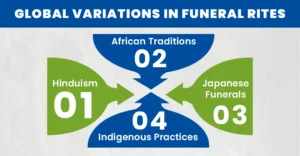Last Updated on: August 22nd, 2025
- Licensed Agent
- - @M-LifeInsurance
Death is something that happens to everyone, no matter where people live in their lives, or what their lifestyle is. Every society has created ways to say goodbye to its loved ones. These ceremonies are known as the funeral rites. Funerals help people honor the person who has died. This also brings comfort to the family and the loved ones. Every culture and tradition has its own way to say goodbye to its loved ones, and this keeps the history alive.
In this guide, we will explain about the funeral and funeral rites also how different religions and cultures practice them. Let’s delve into the basics and important points.
What is a Funeral?
If someone passed away and after the person’s death, there is a ceremony called funeral held to say a goodbye. A funeral ceremony is specifically held for the families and loved ones who gather to say goodbye to the loved ones with love, prayers and some religious practices. Funerals have prayers, rituals, and celebrations that are based on the culture and religion of the family. This helps the families to deal with grief and keep the person’s memories alive.
What is a Funeral Rite?
Funeral rites are the traditional ceremonies that are arranged during the burial or the cremation. These ceremonies are different in every religion and every tradition and there are specific rules in each area to follow. Funeral rites are not just about honouring the person who dies but it also reflects the cultural and religious support for the living.
Why Do Funeral Rites Matter?
Funeral rites are important for so many reasons. They show respect and love for the person who died by following the traditional and religious practices. These rites help the people to feel better by giving a good way to say goodbye to their loved ones. Funerals also bring family and friends close to each other, without these ceremonies, losing someone can feel so hard and incomplete.
Different religions and their Funeral Rites
Every religion has unique and multiple rites and each one of them is respectable because they reflect the culture and tradition and keep the history safe. These ceremonies show how the person who has died should be respected in a religious way and their rites help bring families and communities together to remember them. Let’s look at how different religions do their funeral rites.
Christian Funeral Rites
Christian funeral rites are based on the belief in life after death and resurrection. There are different groups in christianity like Catholic, Orthodox, and Protestant and all these groups have different customs, but most Christian funerals have some things in common.
Wake or Vigil
In this funeral, Friends and family come together to pray and read passages from the Bible, the holy book.
Funeral Service
This is usually held in a church or chapel with hymns, people do read the Bible, a sermon, and prayers for the person who died.
Committal
At the grave or crematorium, the body is given to God’s care, often with the words “ashes to ashes, dust to dust.”
Mourning
Every family’s customs are different, but many families have a gathering or reception after the service.
Buddhist Rites
There is a basic concept in Buddhism about life, death and rebirth. They believe that a person who lives a life can die and then there is a rebirth. Buddhist funeral rites focus on rebirth and the cycle of samsara. The practices are different and they are depending on the school of Buddhism but some common practices are given below;
Chanting
In this ritual, the monks recite the prayers that are called sutras, and this is done for the sake of guiding the spirit towards the lights and the peaceful journey after death. The friends and the family members join this and listen quietly.
Offerings
All the people who are coming to attend the funeral bring flowers, incense, and candles and put them in front of Buddha’s images. This gesture shows respect and devotion. These offerings honor the person who has died and bring blessings.
Meditation and Reflection
Family and friends spend time sitting quietly in the ceremony place, thinking about the person who died, being kind in their thoughts, and learning to accept the loss.
Cremation or Burial
The body of the person who has died is either cremated or buried, this choice is depending on local rituals. This last step finishes the funeral rites and lets the family say goodbye to their loved one.
Muslim Rites
Muslims’ funeral rites are called Janazah and this is all guided by the islamic laws and rules. This rite is giving the lesson for simplicity, humanity and equality in death.
How Much Does Life Isurance Cost?
What are the funeral rites in Islam?
Body Preparation
First, the body of the person who dies is washed and then covered in plain white cloth and then followed by a perfume on the body.
Prayer Service (Salat al-Janazah)
After that, there are a lot of people who gather in an open big place, then they pray together, asking Allah to forgive the person who has died.
Burial
The body is placed in the grave on its right side, facing Mecca.
Mourning
Family members observe a mourning period, with widows observing iddah (waiting period).
Jewish Rites
Jewish funeral rites are deeply rooted in tradition and scripture, focusing on respect for the dead and comfort for the mourners.
Body Preparation
The Chevra Kadisha (holy society) washes and dresses the body in plain white shrouds.
Funeral Service
Held quickly after death, often within 24 hours, featuring prayers such as the Kaddish
Burial
Cremation is generally discouraged; burial in the earth is preferred.
Mourning Practices
Include Shiva (seven days of mourning at home), Shloshim (30 days), and in some cases, a year of remembrance.

What Are Funeral Rituals Called?
Funeral rituals are also called death rites, burial rites, or last rites. These names change depending on the culture or religion.
- In Christianity, “last rites” refers to the final prayers and sacraments given before someone dies.
- The term death rites is used by Anthropologists to study funeral traditions around the world.
- In daily life, people usually use “funeral rites.
Global Variations in Funeral Rites
Beyond the major religions, diverse cultures observe unique funeral traditions:
Hinduism
Hindus believe that there is a rebirth, so cremation is common in their culture. Families perform the rituals according to their religion and then ashes are often scattered in the rivers, this is because they believe that the soul returns to the universe.
African Traditions
In African countries, the community is so lively, so are their funerals. The funerals in African countries include drumming, dancing, and honoring ancestors. These ceremonies respect the person who has died and help bring the community together while connecting with the spiritual world.
Japanese Funerals
Japanese funerals often combine Buddhist, Shinto, and modern practices. Families offer incense, hold memorial services, and typically cremate the body, reflecting respect for the dead and the blending of traditions.
Indigenous Practices
Indigenous funeral traditions are very different in many communities, but most of the time they prefer and focus on giving the body back to nature. They do their rituals according to their ancestors and follow the practices, they try to keep the balance between life, death and the natural world.

The Psychological and Social Role of Funeral Rites
Funeral rites play a very important role in both our minds and society. These help people to cope up with the grief and sadness they feel after the passing away of someone very close and dear. These rites provide structured ways to process the loss. Religious and cultural practices give comfort and create support during difficult times. Funerals also bring families together and give support and connection. Additionally, these rites and final ceremonies link the generation with the traditions and values of their culture and religion. Anthropologists have observed that nearly every culture in history has had some form of death ritual, showing that these practices are a universal and essential part of being human.
Conclusion
Funeral rites are not just the ceremonies that are held, it’s more than that, they are the most important traditions that show what people value most. No matter what the religion is and how people are expressing and practicing their beliefs, these practices bring people together from all the cultures and religions and show respect for those who have passed away. Now we have understood about the funeral rites and traditions from all the religions and cultures, now we know that it is not just a death, but also a life, its meaning and the connection we share with our loved ones and family members.
If you want guidance with funeral planning, traditions, or final expense insurance, reach out to us today and let us help you make the right choice for your loved ones.
FAQs
1. What are funeral rites?
Funeral rites are the traditional ceremonies that are performed by the families when some die, these ceremonies include the burial and the cremation rituals. These rituals are held to honor the person who passes away and provide comfort to the family and friends.
2. Why are funeral rites important?
They help people cope with grief, say goodbye to loved ones, and preserve cultural and religious traditions across generations.
3. How do funeral rites differ across religions?
There are a lot of practicing religions in the world and their ways of doing the funeral are also different. Like in Christianity, they have wakes and services at the church, Buddhists do chanting and believe in rebirth, Muslims say special Janazah prayers and bury the body facing Mecca, and Jews wash the body and follow set mourning traditions at home.
4. What is the social and psychological role of funeral rites?
Funerals help the people so they can feel supported, and can deal with the pain and sadness. This bring families and communities close to each other, and keeps the cultures and traditions alive.

Joyce Espinoza, Expert Life Insurance Agent
Joyce Espinoza is a trusted life insurance agent at mLifeInsurance.com. She’s been in the insurance industry for over ten years, helping people, especially those with special health conditions to find the right coverage. At MLife Insurance, Joyce writes easy-to-understand articles that help readers make smart choices about life insurance. Previously, she worked directly with clients at Mlife Insurance, advising nearly 3,000 of them on life insurance options.





